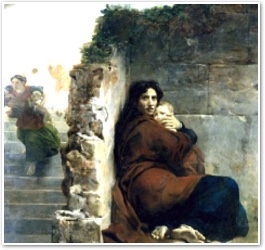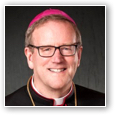Why Christmas Should Bother Everybody
- BISHOP ROBERT BARRON
What bothers me is reducing Christmas to a level so low, so banal, that the great Christian feast is offensive to precisely no one.
 Just a few weeks ago, at a ceremony for the lighting of the national Christmas tree, President Obama remarked on the meaning of the season. Here are some of the things he said:
Just a few weeks ago, at a ceremony for the lighting of the national Christmas tree, President Obama remarked on the meaning of the season. Here are some of the things he said:
"Over these next few weeks, as we celebrate the birth of our Savior, as we retell the story of weary travelers, a star, shepherds, Magi, I hope that we also focus ourselves on the message that this child brought to this Earth some 2,000 years ago — a message that says we have to be our brother's keepers, our sister's keepers; that we have to reach out to each other, to forgive each other. To let the light of our good deeds shine for all. To care for the sick, and the hungry, and the downtrodden. And of course, to love one another, even our enemies, and treat one another the way we would want to be treated ourselves. It's a message that grounds not just my family's Christian faith but that of Jewish Americans, Muslim Americans, non-believers — Americans of all backgrounds."
Now in a way, there is nothing whatsoever wrong with these ideas and sentiments. Who could possibly be against treating others with respect, offering forgiveness for offenses, and caring for those in need? And I certainly don't blame President Obama for making these remarks. Both Democrat and Republican presidents, in their capacity as chief magistrates of the civil religion, have expressed similar convictions for many years. What does bother me, however, is reducing Christmas to a level so low, so banal, that the great Christian feast is offensive to precisely no one. If President Obama is right, even those who profess no belief in God should welcome Christmas with nothing but enthusiasm! But this sort of reductionism is, in fact, directly repugnant to a feast which, in its essence, is revolutionary, subversive, and, if properly understood, offensive to just about everyone.
What could I possibly mean? Well, if we take an honest look at the Biblical texts dealing with Christmas, we will find that they have precious little to do with sentimentality, or the embracing of a common morality, or the cultivation of a "let's all get along" attitude. In the second chapter of Matthew's Gospel, we read of the visit of the Magi, astrologers from "the east," probably from Babylon where a quasi-scientific star-gazing discipline was cultivated. They let it be known that they were in search of "the newborn king of the Jews," whose star they had observed at its rising. When this news was spread about, was it met with delight, enthusiasm, excitement, and sentimental feelings? Hardly. Listen to what Matthew tells us: "When King Herod heard this, he was greatly troubled, and all Jerusalem with him."
It is a provocation, a challenge, a call to conversion of the most radical kind.
Why would the arrival of a tiny baby, who would grow up to bear a message of love, have excited such negativity? We must remember that the child is described as a king, which means someone who comes to rule; more precisely, he is characterized as king of the Jews, and this was the very title that Herod claimed. Therefore, Herod, quite correctly, saw him as a threat to his prerogatives and position. But why would the entire capital be in an uproar? We must recall what the Bible consistently says about cities, that is, the way we human beings typically organize ourselves politically, socially, and culturally. Cain, the murderer of Abel, is the founder of cities; Babel, full of arrogance and imperialistic designs, is seen as a typical city; and Jesus himself implied that the devil controls all the cities of the world. The trembling of all of Jerusalem at the birth of the baby king is a function of the demand that that king will eventually make, the change that his rule will affect. Just to drive this point home, Matthew tells us that Herod, having been duped by the Magi, furiously lashed out, ordering the murder of every boy in Bethlehem under two years of age. Not exactly the reaction of someone who is just delighted that the Christmas season has arrived!
If we examine Luke's account of the birth of Jesus, we find very similar motifs. Luke sets up his story as the tale of two rival Emperors: Caesar, the king of the world, and Jesus, the baby king. While Caesar rules from his palace in Rome, Jesus has no place to lay his head; while Caesar exercises rangy power, Jesus is wrapped in swaddling clothes; while Caesar surrounds himself with wealthy and sophisticated courtiers, Jesus is surrounded by animals and shepherds of the field. And yet, the baby king is more powerful than Augustus — which is signaled by the presence of an army (stratias in the Greek) of angels in the skies over Bethlehem. All four of the Gospels play out as a struggle, culminating in the deadly business of the cross, between the worldly powers and the power of Christ. For Jesus is not simply a kindly prophet with a gentle message of forgiveness; he is God coming in person to assume command. He is the Lord. And the entire New Testament couldn't be clearer that his Lordship means that all those who follow a contrary rule — meaning, pretty much every one of us — are under judgment.
To be sure, the distinctive mark of Jesus' Lordship is love, compassion, forgiveness, and non-violence — but this is not the stuff of sentimentality and warm feelings. It is a provocation, a challenge, a call to conversion of the most radical kind.
 This is Meaghen Gonzalez, Editor of CERC. I hope you appreciated this piece. We curate these articles especially for believers like you.
This is Meaghen Gonzalez, Editor of CERC. I hope you appreciated this piece. We curate these articles especially for believers like you.
Please show your appreciation by making a $3 donation. CERC is entirely reader supported.

Acknowledgement
 Bishop Robert Barron. "'Why Christmas Should Bother Everybody." Word on Fire. (December 13, 2016).
Bishop Robert Barron. "'Why Christmas Should Bother Everybody." Word on Fire. (December 13, 2016).
Reprinted with permission of Bishop Robert Barron.
The Author
 Bishop Robert Barron is the founder of Word on Fire Catholic Ministries and bishop of the Diocese of Winona-Rochester in Minnesota. He is also the host of CATHOLICISM, a groundbreaking, award-winning documentary about the Catholic Faith, which aired on PBS. Bishop Barron is a #1 Amazon bestselling author and has published numerous books, essays, and articles on theology and the spiritual life. He is a religion correspondent for NBC and has also appeared on FOX News, CNN, and EWTN. Bishop Barron's website, WordOnFire.org, reaches millions of people each year, and he is one of the most-followed Catholics on social media. His regular YouTube videos have been viewed over 150 million times. Bishop Barron's pioneering work in evangelizing through the new media led Francis Cardinal George to describe him as "one of the Church's best messengers." He has keynoted many conferences and events all over the world, including the 2016 World Youth Day in Kraków, Poland, as well as the 2015 World Meeting of Families in Philadelphia, which marked Pope Francis' historic visit to the United States. He is author of Exploring Catholic Theology, And Now I See: A Theology of Transformation, Thomas Aquinas: Spiritual Master, Heaven in Stone and Glass: Experiencing the Spirituality of the Great Cathedrals, Eucharist (Catholic Spirituality for Adults), The Priority of Christ: Toward a Postliberal Catholicism, and Word on Fire: Proclaiming the Power of Christ.
Bishop Robert Barron is the founder of Word on Fire Catholic Ministries and bishop of the Diocese of Winona-Rochester in Minnesota. He is also the host of CATHOLICISM, a groundbreaking, award-winning documentary about the Catholic Faith, which aired on PBS. Bishop Barron is a #1 Amazon bestselling author and has published numerous books, essays, and articles on theology and the spiritual life. He is a religion correspondent for NBC and has also appeared on FOX News, CNN, and EWTN. Bishop Barron's website, WordOnFire.org, reaches millions of people each year, and he is one of the most-followed Catholics on social media. His regular YouTube videos have been viewed over 150 million times. Bishop Barron's pioneering work in evangelizing through the new media led Francis Cardinal George to describe him as "one of the Church's best messengers." He has keynoted many conferences and events all over the world, including the 2016 World Youth Day in Kraków, Poland, as well as the 2015 World Meeting of Families in Philadelphia, which marked Pope Francis' historic visit to the United States. He is author of Exploring Catholic Theology, And Now I See: A Theology of Transformation, Thomas Aquinas: Spiritual Master, Heaven in Stone and Glass: Experiencing the Spirituality of the Great Cathedrals, Eucharist (Catholic Spirituality for Adults), The Priority of Christ: Toward a Postliberal Catholicism, and Word on Fire: Proclaiming the Power of Christ.




